Even when they’re not top performers
This article is from my list of nine surprising high performance lessons from Hell’s Kitchen. The show is chock full of swearing, apologies for any colourful language that finds its way in here.
Summary
- Diversity improves performance
- Bias is deep and hurts teams
- Top performers overcome bias to focus on actual ability/results
- Moves are motivating

Red vs Blue
The contestants line up in front of Gordon Ramsey for judgment.
Tension is high.
Who is going home?!
Chef calls a name, the contestant walks forward, sure of her defeat. Ramsey tells her to take off her jacket, and just when the contestant thinks she will be asked to leave…
Chef puts her on the men’s team.
Phewph.
She has one more chance to prove herself.
Every season of Hell’s Kitchen starts with a red women’s team, and a blue men’s team. At some point Chef mixes them up. Like any good coach, Mr. Ramsey is moving key players in the hopes of a new result, most of the time this works.
Chef moves people for one of three reasons:
- Move off: The individual is struggling. They are moved off the team to have a chance in a new environment (team).
- Move to: A team is struggling and they need a strong performer/leader. A top performer self selects, or is asked, to move to the weaker team.
- Mix it up: (Rarely) both teams are a mess and Mr. Ramsey just needs to try something.
It’s not easy. Bias runs so deep that even if the men’s team clearly needs help, the men ignore their new female teammate.It’s worse for women of colour, especially young ones, who are initially ignored by both teams.
The good news for everyone is that Chef Ramsey see’s through the bullshit. He is laser focused on results, not gender. He undertsands team dynamics, and leadership so he makes the moves.
Now seems like a good time for a reminder that I’m not a psychologist¹. I’ve just been leading teams for (gulp) over 20 years, have watched too much Hell’s Kitchen, and love nerding out about behaviour and teams. Professionals like Adam Grant could provide more accurate analysis, but in the mean time, isn’t this fun to think about!
Diversity improves performance
It is obvious that a top performer would improve any team (it’s what top performers do). The crazy thing is that men’s teams improve even when the woman added is not that strong, has been labeled by the women’s team as hard to work with, or even if she really is a pain.
The integration of the new person (and gender) forces increases in communication and engagement on the struggling men’s team. Because a high level of communication is key to winning challenges, and especially dinner service, the integration/new dynamic re-enforces behaviours required to win.
Blue vs Red: Different approaches
The team’s re-formation creates a partial reset that almost never starts off on a good foot. It’s messy to rebuild a team. There are egos, and ways of doing things. But the work pays off (most of the time).
When men join women’s teams they have questions, but mostly answers (unasked for), and tend to be less open to learning how their new team works. Because of this, they rarely improve the women’s team. (The most respected/liked men do not demonstrate these negative behaviours).
Women behave very differently.
They listen.
They increase effective communication (most of the time), change the dynamic, and add new perspectives (that are initially ignored). It takes more than one service or challenge, but eventually leads to changes that benefit the team. As in “I hadn’t thought of that!” or “I would never have combined those ingredients” or “thanks for seeing that I needed help”.
The truth (from actual research published by HBR, not just my reality TV fun) is that Women Score Higher Than Men in Most Leadership Skills.
So if women are so good at leading, why do men ignore and belittle them?
Working through bias
Unconscious bias is blatant in Hell’s Kitchen². Maybe reading about it here will help you see, and address, it in your own job.
Men struggle through a significant amount of unconscious (and sadly often conscious) bias -especially, when the women are great, of colour, or young.
Men love it when they feel heard -so do women, but the men don’t seem to care about that.
How bias shows up (mansplaining and more)
One of the first things men do when a women joins the team is mansplain everything.
This varies from a general mansplain about how the team works, to how to set up a station, how to prep, organize, sear steak, or whatever. It happens every time, and it’s always condescending. To be fair, the men do this to each other too, just never as much as they do to women.
Their new female colleagues listen (even when being told utter bullshit that they already know) and don’t interrupt (mostly). This helps build the relationship. Men love it when they feel heard -so do women, but the men don’t seem to care about that.
Like all top performers, these women are not wallflowers; however, they are good listeners; at least better listeners than the men. While it’s got to suck to absorb this mansplaining, women listen, then, at a time when the men can also listen, they clearly and assertively engage, correct, or otherwise educate their male colleagues.
It’s shitty that this is what women have to do, but it seems to be the most effective way to deal with mansplaining; it works with all men, from the well intentioned to the absolute a-hole. Ironically, the moved contestant often demonstrates a more effective form of communication than she did (or was subjected to) on their original all female team. By listening⁴ (even to the bullshit) they are actively improving the general communication on the team and building trust. Crazy.
Of course, mansplaining is just the tip of the anti-female iceberg of bias that is a men’s team.
Like an iceberg Bias runs deep
Contestants overtly bias to value qualifications (culinary school) and pedigree (fancy restaurant experience) over actual results. They also tend to unconsciously de-value contributions from young contestants and women of colour. In a situation where teams are judged on actual results, both of these are incredibly unhelpful ways of thinking (interviewers take note?).

The team will rarely acknowledge they are biased against things they are not supposed to be.
Mostly, they do not say the problem is: she is young/a woman/of colour.
They do say: she lacks pedigree, finesse, qualifications.
There are some real dip shits who do say (in their perceived safe space on national syndicated television) a woman is not good because she is a woman. Never do they say out loud they are judging her based on her skin colour. They don’t need to say it, they just do it.
Bias is so ingrained, that it frequently needs to be addressed by Chef Ramsey. Mr. Ramsey does this by pointing out the demonstrably great skills of an individual whom a team is biased against. When Chef Ramsey, the dominant white male leader, says the young woman of colour has skill, suddenly all the other guys (grudgingly) realize how right he is.
Oh, she does have skill.
Sadly, it’s less about seeing her, and more about hearing him.
Ugh. At least it’s a start?
Bias hurts teams
SPOILER: The mens treatment of twenty-five year old Sade in season 13 is exemplary of how bias hurts teams, and how the men need Chef to correct them.
The blue team is struggling, Sade is doing well. Chef moves her to the men’s team to help them. She’s not happy. The men resent her. They mansplain everything. She leads them to a much needed win by bailing out the meat station during a crashing dinner service.
The next day during the team challenge have the men changed their tone? No. Despite having first hand experience being saved by Sade, they don’t even bother to taste her dish at the challenge, and do not put it up for Chef to judge.
The men lose the challenge (dummies).
Chef Ramsey cares about the customer experience, about the food, not the age, skin colour, gender, school, location, or anything else about the person who cooked it. Ramsey tastes Sade’s dish in front of both teams then tells the men that if they’d put that up they would have won.
She goes on to win third place. None of the mansplaining men make it that far.
Results matter, the rest is just biased guessing.
Top performers fight through bias
Most contestants aren’t top performers, so time and time again women are ignored by men and it hurts the men’s performance. Men seem to forget what a winner can look like.
The best performers on Hell’s Kitchen do not have this same level of bias. They can’t afford to. They need to be able to critically assess the competition in order to win.

It is striking that when top performers are brought back in the All-Star Season, the men are not biased against the women. The men are highly aware of the skills of each individual and focus on team performance. They communicate and are aligned (behaving much as winning women’s teams do in seasons 11–16).
Across multiple seasons, contestants who are quickest to drop their bias (or don’t start with any) go further than others.
Top performers overcome bias to focus on actual ability, and work well with teams, even in individually competitive environments.
Moves are motivating
Struggling teams embrace gaining, or losing, a team member. Successful ones do not.
Underperformers
Struggling contestants who switch are always happier; if only because they are now hyperaware that they need to improve performance. This translates (roughly) as:
- Phewph. I just avoided being fired. Chef has intense eyes. I don’t want to feel like that ever again. I am so lucky.
- Given that their old team put them up for elimination: F my old team. I want to crush them for almost getting me fired! Hey, new team, let’s win!
Which translates into action:
I want to be here. I’d better pull it together and kick ass, or I’m going to be gone.
Top performers
Top performers are generally not happy about being moved. They were on the winning team! Why are they being punished for being so good?
Because it is hard to have a peer recognized as better than you, struggling teams are not welcoming to their top performing help — especially those with big egos.
Moving a top performer is hard. The leader risks negatively impacting the great team. The top performer is likely to struggle for a bit. But it works, especially when they add diversity to a team.
Okay, but what can I do?
I’m not an expert. One of the first things to do is continue learning (a focus for me too). John Amaechi’s youtube or instagram is a great place to start. Because he (unlike me) is an actual behavioural psychologist, he is also an amazing resource way beyond diversity and bias issues.
If you are a leader you can
- Hire or restructure to have diverse teams. You will get better results.
- Write inclusive role descriptions (no rock stars or ninjas needed).
- Interview for performance, not experience.
All of us can
- Consider our own biases and learn. Share what we are learning with our teams. Become a humble teacher.
- Point out to others when their unconscious bias flares⁵.
- Invite people who are diverse (relative to our teams), to a collaboration meeting, to a stand up, onto a project. A different perspective will help the work, and interacting with a different type of person will open minds.
- Grow our networks. Meet new people who are not the same as us. Do this with intention.
- Stop making up excuses and start today.
We will make mistakes. That’s fine, let’s not beat ourselves up.
Let’s just start moving forward.
Because wouldn’t we rather be on a winning team?
I hope you enjoy this series of performance lessons from Hell’s Kitchen. If you have a comment, feedback, or idea add it below, shoot me an email, or send me a tweet.
Keep reading.
Ian
¹My dad is a retired doctor of clinical neurological psychology. I grew up taking the tests he devised for his masters. I like to think some of that rubbed off, but he’s the psychologist not me..
²At some point it’s worth talking more deeply about how too often men’s teams are incredibly sexist and mean in their attitudes toward women, and how those highly negative men first teams do not produce winners.
³From Psychology today article reference is: Farley, Ashcroft, Stasson, and Nusbaum. 2010. “Nonverbal Reactions to Conversational Interruptions: A Test of Complementary Theory and Status/Gender Parallel.” Journal of Nonverbal Behavior 34(4):193–206.
⁴Here is an amazing bit about the power of listening from This American Life. More about this in Hell’s Kitchen performance lesson #7: Remove bottom performers: That one bad apple is worse than you think
⁵Like that time last week I had to point out to a generally outstanding human that it was inaccurate and biased to call that peach-ish colour on the project timeline “flesh tone” . We’re all learning and unlearning.

